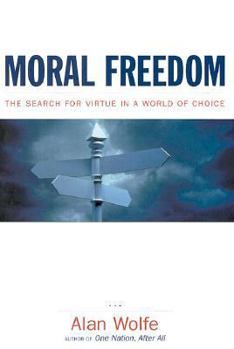Moral Freedom: The Impossible Idea That Defines the Way We Live Now
Select Format
Select Condition 
Book Overview
How Americans describe their guiding principles in an exhilarating and unnerving new era of moral freedom. What is the difference between right and wrong? What does it mean to lead a good life? How binding is the marriage vow? What are your obligations to an employer? To your friends? To yourself? Is it always immoral to tell a lie? Eminent sociologist and public intellectual Alan Wolfe asked Americans around the country such questions in order to...
Format:Hardcover
Language:English
ISBN:0393048438
ISBN13:9780393048438
Release Date:January 2001
Publisher:W. W. Norton & Company
Length:256 Pages
Weight:1.22 lbs.
Dimensions:0.9" x 6.4" x 9.5"
Customer Reviews
3 ratings
Worth your time
Published by Thriftbooks.com User , 17 years ago
This would be a great book to read with a book club or a couple friends. The content makes for great conversation. It is also written in a way that makes reading easy.
Exceptional Assessment of American Values
Published by Thriftbooks.com User , 20 years ago
Wolfe provides a litmus test of where we are in America today as we move towards greater moral freedom. He does not provide personal pronouncements of what should be considered right or wrong. Rather, he interviews people from varying social backgrounds to get their views on matters ranging from indulgence of the self to forgiveness of others. Wolfe captures Americans' search for a moral compass in world that has drastically changed from their parents' time. He shows how individuals are trying to cultivate their own sense of morality while trying to balance allegiance to one's self and to society as a whole. In the face of monumental change, American conversation regarding our values has been polarized between two competing, and extreme, dogmas. Wolfe provides a balanced framework to assess where we're headed. "Moral Freedom" is a must read for anyone wishing to find solutions that work for mainstream America.
Grave New World?
Published by Thriftbooks.com User , 23 years ago
You've got to hand it to Alan Wolfe. Building on "Whose Keeper" and "One Nation After All," Wolfe's latest book "Moral Freedom" is a tour de force which examines Americans' views of morality in the age of expressive individualism and rampant consumerism. Using a methodology similar to the one he employed in "One Nation After All," Wolfe interviews a random selection of 200 Americans in 6 geogrphical locations ranging from the Castro district in San Francisco to a small midwestern town in Iowa. Coupling these interviews with a nationally representative telephone survey conducted with CBS, Wolfe gets down to cases fast. Asking eternal moral questions, e.g. what is virtue, what is vice?, Wolfe comes to a startling conclusion: Americans have for the most part jettisoned traditional teachings of religion in favor of a looser, more pragmatic situational ethics. Although some of Wolfe's respondents hew to very specific religious beliefs, even these individuals are loathe to cast the first stone against those who might not agree with their beliefs. In terms of narrative strategy, Wolfe uses the gay and lesbian population of the Castro district as one end of the moral spectrum, the small town folks in Iowa as the other pole, and finds they have a lot in common with all the other folks in between. He does stop and point out differences along the way, of course, but in the main, finds considerable agreement. The extended quotes from Americans to whom Wolfe and his colleagues talk demonstrates how smart and thoughtful the average American really is -- as Wolfe showed us in "One National After All." But there is something troubling about their articulateness, too. Some of it sounds like "Oprah-speak" -- there's lots of forgiveness, lots of psychologizing mixed in with the strains of good 'ol American pragmatism. His main thesis is that we have now arrived in a brave new world of "moral freedom" but have not descended into moral anarchy, a fear espoused by moral philosophers from the Greeks onward is a tad overdone. (His short survey of moral philosophers' views on the question is illuminating -- but for his real thinking on these questions look at "Whose Keeper"). It may be that Wolfe is given to seeing the new era of "moral freedom" because of a kind of teleological necessity induced by his earlier works. I mostly buy it -- it makes a good story -- but I'm a little skeptical that the diverse voices he captures here really add up to proving his thesis.Still, thought-provoking, insightful, using empirical social science in conjunction with his theoretical speculations, with "Moral Freedom" Wolfe has pushed his exploration of morality into a new and invigorating space.






